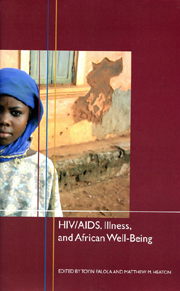Book contents
- Frontmatter
- Contents
- Acknowledgments
- Part I Context
- Part II Illness Case Studies
- 2 Waterborne Diseases and Urban Water Supply in Makurdi, Nigeria, 1927–60
- 3 Smallpox and Social Control in Colonial Saint-Louis-du-Senegal, 1850–1916
- 4 Poor Man's Trouble, Rich Man's Graveyard: A Study of Malaria and Epidemiological Sciences since the Nineteenth Century
- 5 Perceptions of Epilepsy in a Traditional Society: An Akan (Ghana) Family's Experience
- 6 Disability in Nigeria
- Part III Globalization, Development, and Health
- Part IV HIV/AIDS
- List of Contributors
- Index
- Rochester Studies in African History and the Diaspora
6 - Disability in Nigeria
from Part II - Illness Case Studies
Published online by Cambridge University Press: 05 February 2013
- Frontmatter
- Contents
- Acknowledgments
- Part I Context
- Part II Illness Case Studies
- 2 Waterborne Diseases and Urban Water Supply in Makurdi, Nigeria, 1927–60
- 3 Smallpox and Social Control in Colonial Saint-Louis-du-Senegal, 1850–1916
- 4 Poor Man's Trouble, Rich Man's Graveyard: A Study of Malaria and Epidemiological Sciences since the Nineteenth Century
- 5 Perceptions of Epilepsy in a Traditional Society: An Akan (Ghana) Family's Experience
- 6 Disability in Nigeria
- Part III Globalization, Development, and Health
- Part IV HIV/AIDS
- List of Contributors
- Index
- Rochester Studies in African History and the Diaspora
Summary
Studies on the health of Africans have increased substantially during the past couple of decades. For the most part, recent studies have concentrated on reproductive health issues, malaria, and HIV/AIDS. One health topic that is rarely addressed in African health research is disability. Not much is known about prevalence, determinants, and impact of disability among African populations. While disability is generally associated with reduced labor force participation, it also has social, cultural, and political consequences. As governments adopt policies and institute programs to ensure the full participation of the population with disability in all national activities, they often face the challenge of identifying the population with disability, and the extent and type of disability. There is, indeed, a great need to understand the magnitude of the problem in order to develop intervention programs.
Since the 1982 United Nations World Program of Action Concerning Disabled Persons, many countries have affirmed the importance of information on disability for developing programs and policies that promote the threefold objectives of prevention of disability, rehabilitation, and realization of the full participation of disabled persons in social life and economic development. Such information, however, is not being collected and analyzed on a regular basis. For this reason the UN recommended that disability should be included in national censuses in order to provide “a valuable source of information on the prevalence and distribution of disability in the population at national, regional, and local levels and give possibilities for its correlation with data on employment, level of education and other relevant variables collected in the census.”
- Type
- Chapter
- Information
- HIV/AIDS, Illness, and African Well-Being , pp. 116 - 152Publisher: Boydell & BrewerPrint publication year: 2007



